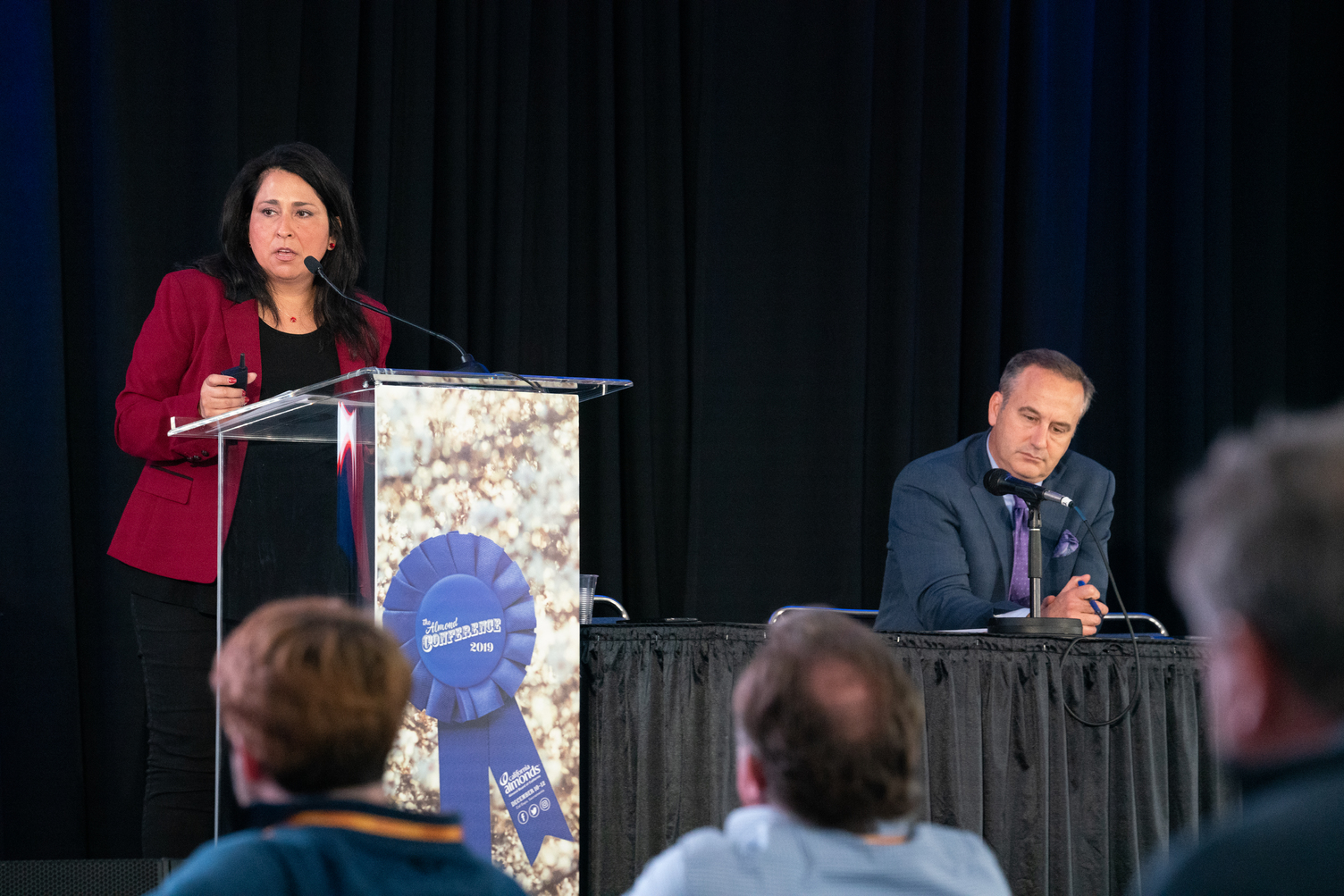One of the strongest ways growers can influence decisions in Sacramento and Washington D.C. is through direct engagement, according to leaders representing the California almond industry’s advocacy arm.
 Trevino provided updates on a wide spread of legislative issues during this session, including information on Assembly Bill 5, which impacts employees and independent contractors within the state of California.
Trevino provided updates on a wide spread of legislative issues during this session, including information on Assembly Bill 5, which impacts employees and independent contractors within the state of California.
President of the Almond Alliance of California Elaine Trevino moderated a panel discussion at The Almond Conference 2019 last December where she updated attendees on the Alliance’s advocacy efforts in the state and nation’s capitals. She discussed her team’s efforts to address increasingly serious issues surrounding global trade and continued legislative and regulatory efforts that could affect availability of labor, crop protection tools and other issues important to the industry.
While Alliance staff work diligently on a variety of issues, it is almond industry members, and specifically growers, who play an extremely important role, she said.
“Our ultimate goal is to raise awareness, and what’s critical are growers, candidly,” Trevino said. “We want to get more people engaged, get more people knowledgeable, get more people active and show our legislators growers’ passion for what they do, how they treat their workers and how they value their land.”
Dennis Albiani, a Sacramento-based lobbyist for the Alliance, said that the first year under the administration of California Gov. Gavin Newsom brought several challenges and increasing attention to issues important to agriculture.
Albiani explained that among the 2,625 bills introduced in the legislature in 2019, some had (or still have) potential to directly hurt or help the almond industry. He highlighted the Alliance’s efforts on several bills, including:
- Assembly Bill 5 (Gonzalez): This worker status bill impacts employees and independent contractors. It codifies a court decision that presumes a worker is an employee unless a hiring entity satisfies a three-factor test. This bill was signed by Governor Newsom.
- Senate Bill 54 (Allen) and Assembly Bill 1080 (Gonzalez): The “California Circular Economy and Plastic Pollution Reduction Act” aims to achieve 75% reduction in single-use packaging and certain single-use products by 2030. The Alliance expressed concerns about burdensome reporting and substantial penalties included in the law. These bills were held on each house floor and are two-year bills.
- Senate Bill 347 (Monning): The “Sugar Sweetened Beverages” would mandate warning labels on beverages sold in California that include sugar as an ingredient. Alliance advocates were able to have “almond milk” removed from the legislation. The bill was held by the Assembly Health Committee.
Regarding Assembly Bill 5, Albiani pointed to serious “gray areas,” especially regarding long-term trucking contractors, and advised growers, “If you haven’t heard about AB 5, you need to call your H.R. lawyer and have a conversation about what you need to know.”
Albiani also pointed to several bills that – though they did not pass in 2019 – are likely to return in 2020. These bills could threaten the availability of important, yet heavily embattled, crop protection materials such as chlorpyrifos and glyphosate.
Even though these chemicals have undergone safety assessments and are used appropriately, political considerations are getting in the way of what science shows. “These are tools in the grower’s toolbox,” Albiani said. “We do educate about integrated pest management, but at the end of the day, we still need certain applications for times when pest situations get out of hand.”
Trevino also reported on the Alliance’s opposition to the listing of bumblebees under the California Endangered Species Act, noting that if insects are listed under the act it could mean extremely burdensome regulations for growers. She said the Alliance is working with a coalition of other groups to mount a legal challenge in opposition to the listing process.
Looking to successes in 2019, Trevino pointed to work the Alliance performed in cooperation with the Almond Board to ensure growers remained eligible for the second round of funding through USDA’s Market Facilitation Program, which was established to provide payments to agricultural commodities – including almonds – that were directly impacted by foreign retaliatory tariffs.
Industry members are encouraged to learn more about the Alliance’s advocacy efforts in their 2019 Advocacy Report.